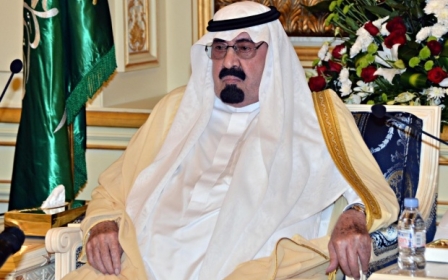Iran foreign minister in rare Saudi visit, Obama to follow in paying respects

Iran's foreign minister arrived in Saudi Arabia on Saturday for a rare visit to the regional rival, bringing condolences after the death of King Abdullah, television pictures showed.
Saudi officials greeted Foreign Minister Mohammad Javad Zarif after he landed at a military airport in the capital Riyadh.
Iran and Saudi Arabia have had troubled relations in recent years, as they compete for influence in the Middle East.
Zarif has previously declined a Saudi invitation to visit the kingdom, citing continued negotiations between his country and international powers over Iran's disputed nuclear programme.
In August last year Iran's Deputy Foreign Minister Hossein Amir-Abdollahian held talks with Saudi Foreign Minister Prince Saud al-Faisal in the Red Sea city of Jeddah.
That was the first high-level Iranian visit to the kingdom since Hassan Rouhani became Iran's president a year earlier.
They discussed the fight against Islamic State group, who both nations oppose.
Rouhani has stated his wish to improve relations with Iran's neighbours, especially Saudi Arabia.
Since the June 2013 election of Rouhani, regarded as a moderate, Iran has engaged in a diplomatic push with Riyadh but relations have soured in recent months over the falling global price of oil.
Both countries are members of the Organisation of the Petroleum Exporting Countries (OPEC) but Iranian officials have expressed frustration at Saudi Arabia for not taking steps to cut supply.
Iran has been among the oil exporting countries worst hit by the price fall.
Rouhani expressed his condolences after the death on Friday of Saudi King Abdullah, who has been succeeded by his half-brother Salman.
Former Iranian president Akbar Hashemi Rafsanjani, known for his strong personal relations with the kingdom, called the country a friend and said: "For the deceased I ask for vast blessings from God, for his family and dynasty."
Referring to its new ruler, King Salman, Rafsanjani added: "For your excellency I wish success in consolidating the unity of the Islamic world, prosperity, coexistence and brotherhood of the two nations of Iran and Saudi Arabia under the lofty teachings of Islam."
Obama cuts short India visit to meet new Saudi king
Meanwhile, US President Barack Obama has cut short his visit to India, cancelling a planned trip to the Taj Mahal, to "pay respects" to new King Salman in Saudi Arabia, the White House said Saturday.
Obama was scheduled to go to India's famed monument to love accompanied by First Lady Michelle Obama at the end of a three-day visit to the country, during which he is to be chief guest at Monday's Republic Day celebrations.
Instead, the White House said Obama would travel to Riyadh from New Delhi on Tuesday morning to meet the new Saudi monarch.
"The president regrets that he will be unable to visit Agra during this trip," said White House press secretary Josh Earnest in a statement, referring to the town where the Taj Mahal is located.
Vice-President Joe Biden had been due to represent the US in Riyadh, where dignitaries and leaders from around the world were arriving in Saudi Arabia Saturday to offer their condolences.
The White House said Biden would now remain in Washington.
Long-standing ties between the US, an old democracy, and Saudi Arabia, an ultra-conservative monarchy, have strained at times, but the unlikely allies remain bound by mutual interests in regional stability and oil.
Full diplomatic relations between the US and the Gulf kingdom were established in 1940 during the throes of World War II.
Stay informed with MEE's newsletters
Sign up to get the latest alerts, insights and analysis, starting with Turkey Unpacked
Middle East Eye delivers independent and unrivalled coverage and analysis of the Middle East, North Africa and beyond. To learn more about republishing this content and the associated fees, please fill out this form. More about MEE can be found here.




